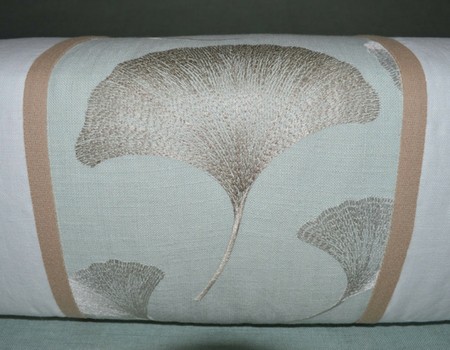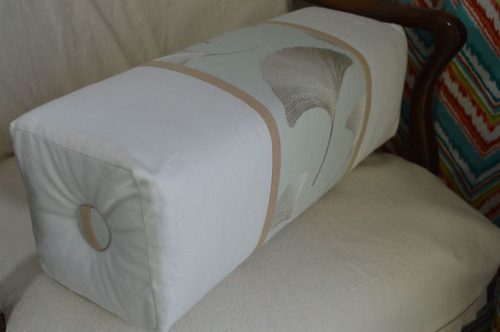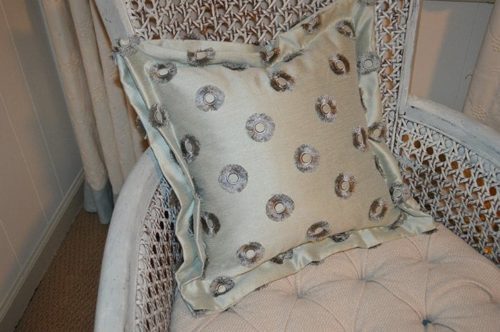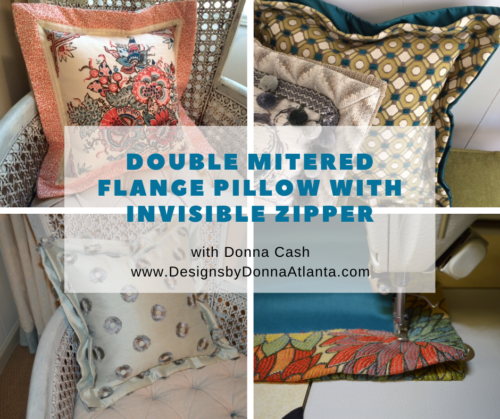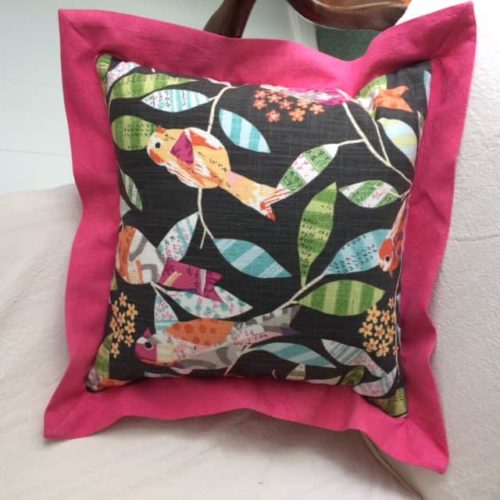- Which options are available so you can confidently order a Ripplefold drapery rod
- Understand what the different fullness percentages really mean
- How to figure out seam placement so your seams will not fall on the front of a fold
- How to fabricate a Ripplefold drapery panel
-
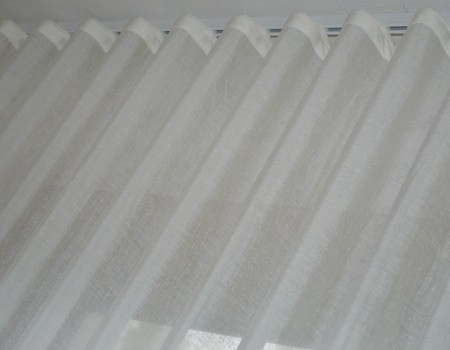 In this PDF you will learn:
In this PDF you will learn: -
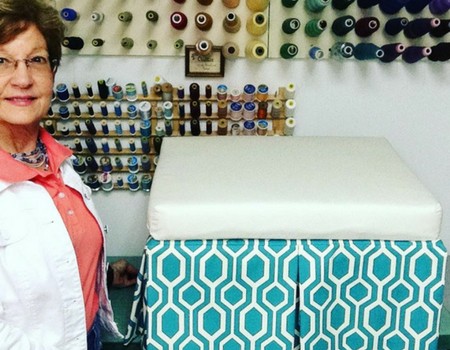 This tailored bed skirt video includes a downloadable PDF list of the supplies and materials needed. The PDF also includes forms to help you with measuring and figuring fabric yardages.
This tailored bed skirt video includes a downloadable PDF list of the supplies and materials needed. The PDF also includes forms to help you with measuring and figuring fabric yardages.- 7 Streaming HD video lessons with anytime, anywhere access
- Watch on any device
- Over two hours of close-up instruction from an expert
- Answers to student questions from instructor Donna Cash and owner of Kim’s Upholstery, Kimberley Chagnon
- Discussions with other members in the DIY Group
-
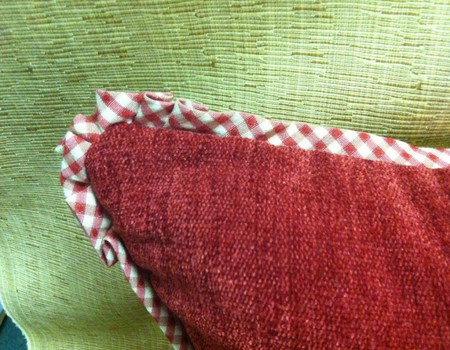
 In the PDF you will learn:
In the PDF you will learn:- How to make and apply flat flanges to pillows
- How to add pleated flanges to the corners of pillows
- How to make a simple stitched flange for pillows
-
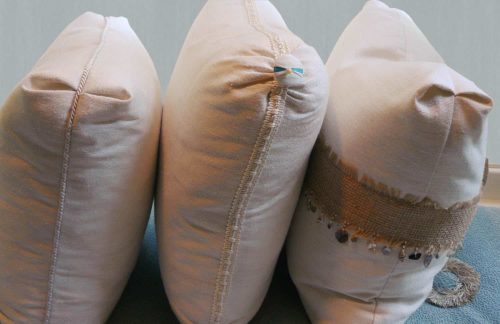
 In this PDF you will learn:
In this PDF you will learn:- Three different ways to sew a Turkish corner in a pillow
- Butterfly, Gathered, Folded and Stitched
- Common misconceptions in Turkish corner sizing
- How to determine the size for knife edge inserts for boxed pillow covers
-
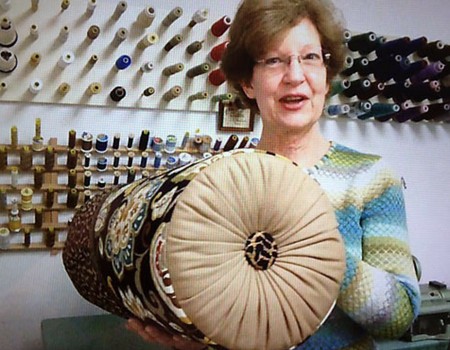 How to Make Bolster Pillows includes: In this bolster pillow video I will teach you how to make a bolster pillow, add fabric covered buttons and add multiple fabrics in one project.
How to Make Bolster Pillows includes: In this bolster pillow video I will teach you how to make a bolster pillow, add fabric covered buttons and add multiple fabrics in one project.- 9 Streaming HD video lessons with anytime, anywhere access
- Watch on any device
- Over two hours of close-up instruction from an expert
- Answers to student questions from instructor Donna Cash, and owner of Kim’s Upholstery, Kimberley Chagnon
- Discussions with other members in the DIY Group
-
 In this video, you’ll learn how to make a basic duvet cover with a stitched flange and a flat welt with split corners. You’ll also learn how to insert an invisible zipper. You’ll learn the difference between a duvet and a duvet cover, and how to understand take up. In this video, you’ll learn how to make a basic duvet cover with a stitched flange and a flat welt with split corners. You’ll also learn how to insert an invisible zipper. You’ll learn the difference between a duvet and a duvet cover, and how to understand take up. Get out your tape measures and calculators as you’ll learn how to measure a bed for a proper fitting duvet cover, and how to calculate yardage.
In this video, you’ll learn how to make a basic duvet cover with a stitched flange and a flat welt with split corners. You’ll also learn how to insert an invisible zipper. You’ll learn the difference between a duvet and a duvet cover, and how to understand take up. In this video, you’ll learn how to make a basic duvet cover with a stitched flange and a flat welt with split corners. You’ll also learn how to insert an invisible zipper. You’ll learn the difference between a duvet and a duvet cover, and how to understand take up. Get out your tape measures and calculators as you’ll learn how to measure a bed for a proper fitting duvet cover, and how to calculate yardage.Highlights in this video include:
- Duvet cover with stitched flange edge
- How to add flat welt with split corners
- Understand the difference between a duvet and a duvet cover
- How to understand take up
- How to insert an invisible zipper
- How to measure a bed
-
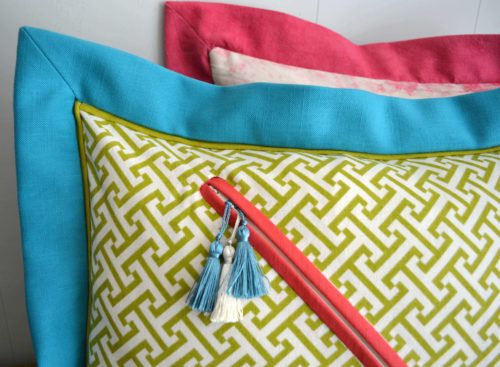
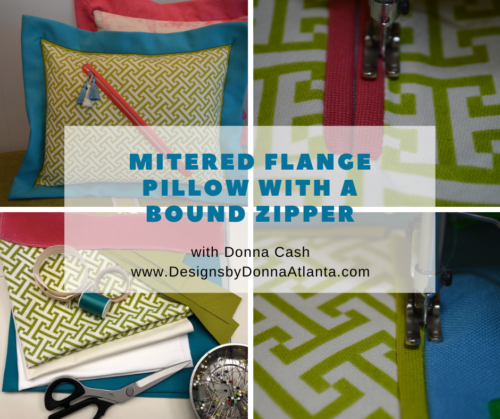 In the PDF you will learn:
In the PDF you will learn:- How to make a reversible contrast mitered flange pillow.
- How to make a bound zipper that is both functional and decorative.
- How to add a unique flat flange detail to a mitered flange pillow.
- Step by step instructions with photos included.
-
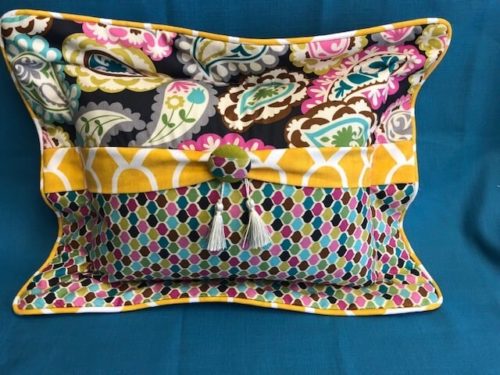
 In this video, Donna Cash will teach you how to make a pillow sham with a stitched flange with contrast welt cord around the edges.
In this video, Donna Cash will teach you how to make a pillow sham with a stitched flange with contrast welt cord around the edges.- In this video, Donna Cash will show you how to make a pillow sham with a stitched flange with contrast welt cord around the edges. The front of the pillow is color blocked with a unique feature band covering the zipper.
- Wait until you see the unusual zipper Donna teaches in this video. And of course, Donna loves embellishments, so you will learn to make a few embellishments for your pillow sham.
- The back of the pillow is made with one fabric.
- This video includes a PDF downloadable list of the supplies and materials needed. The PDF also includes forms to help you with pillow fabric cut sizes.
- 6 Streaming HD video lessons with anytime, anywhere access
- Watch on any device
- Nearly an hour of close-up instruction from an expert
- Answers to student questions from instructor Donna Cash and owner of Kim’s Upholstery, Kimberley Chagnon
-
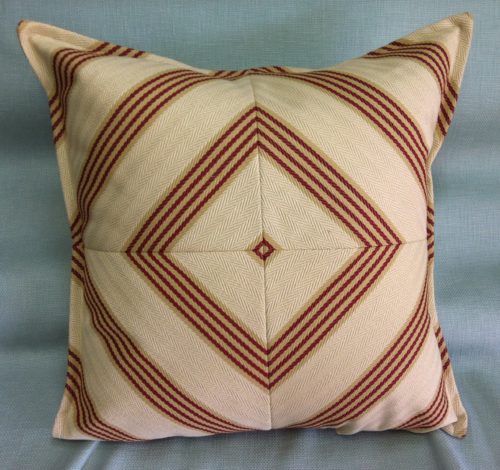
 Pieced Striped Pillows Made Easy - PDF Download. Working with striped fabric to create directional pattern and impact to pillow designs. Have you ever cut out and stitched together a pieced, striped pillow, matched the stripes perfectly, only to lay it back out on the table and the stripes were not going in the direction you expected? I have! And I have seen this happen in the classroom as well. That is why I’ve created this educational PDF for you. This PDF tutorial will help you understand –
Pieced Striped Pillows Made Easy - PDF Download. Working with striped fabric to create directional pattern and impact to pillow designs. Have you ever cut out and stitched together a pieced, striped pillow, matched the stripes perfectly, only to lay it back out on the table and the stripes were not going in the direction you expected? I have! And I have seen this happen in the classroom as well. That is why I’ve created this educational PDF for you. This PDF tutorial will help you understand –- Pieced, striped pattern designs and how they differ from one another.
- How to cut striped fabrics for a specific design.
- Patterning for the pieced, striped pillow.
- How to work with uneven striped fabric.
- How to deal with the bias cuts and how to stabilize your fabric.
- Stitching methods for the best pattern match.
- Pricing for the pieced striped pillow.
-
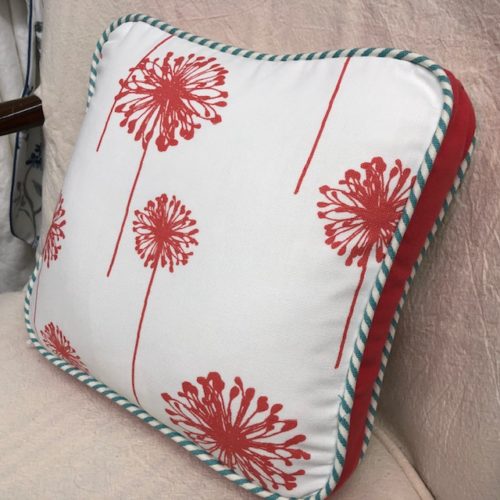
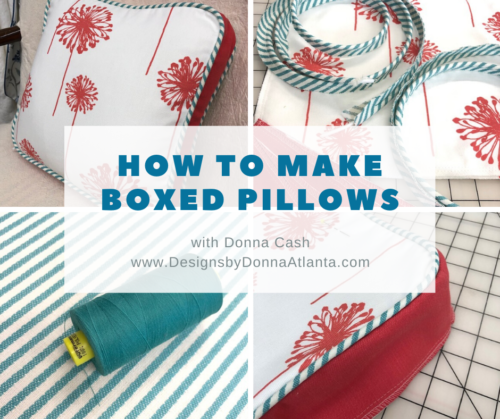 Boxed pillows may appear to be the same as boxed cushions. The difference is pillows are designed to sit up on one end and cushions are most often sat upon. Making boxed pillows can be tricky. Especially getting those corners matched up perfectly. The boxed cushion in this tutorial has an invisible zipper closure, rounded corners, boxing strips that are cut into four sections and stitched in the corners, with optional topstitching, and piping along the front and back edges of the pillow. Have you ever perfectly planned your pattern placement for your boxed pillow, stitched the welt cord around the front and back pieces, and then added the boxing strip only to realize the corners did not all match up? I have! And I have seen this happen in the classroom as well. That is why I’ve created this educational PDF for you. This PDF tutorial will teach you how to -
Boxed pillows may appear to be the same as boxed cushions. The difference is pillows are designed to sit up on one end and cushions are most often sat upon. Making boxed pillows can be tricky. Especially getting those corners matched up perfectly. The boxed cushion in this tutorial has an invisible zipper closure, rounded corners, boxing strips that are cut into four sections and stitched in the corners, with optional topstitching, and piping along the front and back edges of the pillow. Have you ever perfectly planned your pattern placement for your boxed pillow, stitched the welt cord around the front and back pieces, and then added the boxing strip only to realize the corners did not all match up? I have! And I have seen this happen in the classroom as well. That is why I’ve created this educational PDF for you. This PDF tutorial will teach you how to -- Plan the pattern placement
- Cut the pillow pieces based on the size of your pillow insert
- Insert an invisible zipper between the welt cord and the boxing
- Assure the corners will all match up
- Add optional topstitching at the corners of the boxing
- Price boxed pillows
-
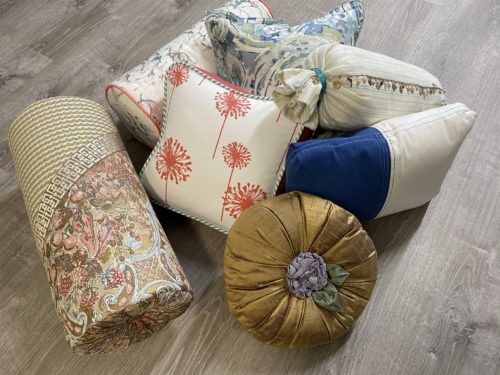
 The fill inside a pillow form may make or break your beautifully fabricated pillow cover. The information covered in this PDF download will help you to confidently select the right pillow form, the fill type for your style of pillow cover, where to purchase, and answers many of the most frequently asked questions regarding pillow forms. My goal while teaching and sharing is to: Help you build your confidence so you can build your skills and business. That is why I have created this educational PDF for you. This PDF tutorial will help you understand –
The fill inside a pillow form may make or break your beautifully fabricated pillow cover. The information covered in this PDF download will help you to confidently select the right pillow form, the fill type for your style of pillow cover, where to purchase, and answers many of the most frequently asked questions regarding pillow forms. My goal while teaching and sharing is to: Help you build your confidence so you can build your skills and business. That is why I have created this educational PDF for you. This PDF tutorial will help you understand –- Shapes
- Fill Type
- Sizes
- How to Find Your Favorite Insert
- Where to Buy
- Commonly Asked Questions
-
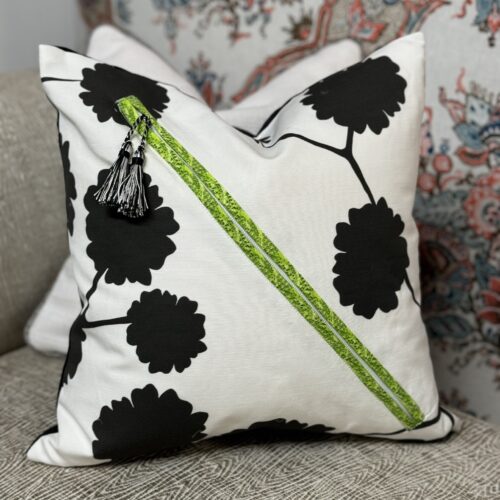
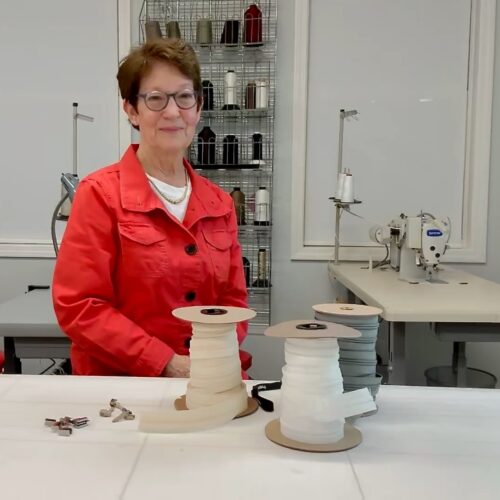
In this video, Donna Cash takes the fear out of sewing zippers.
In this video course, you will learn 5 different types of zipper sewing techniques. Learn the basics as you sew along with industry expert, Donna Cash as she demonstrates step-by-step techniques for 5 different zipper applications. Once you learn the basic steps, you will have the skills and confidence to insert zippers into pillows, bedding, cushions, and more. This class is for you, whether you are a DIYer wanting to make pillows for your home or a professional who needs some help honing your skills. Remember, as Donna always says, “Practice makes perfect. You can do this!”

